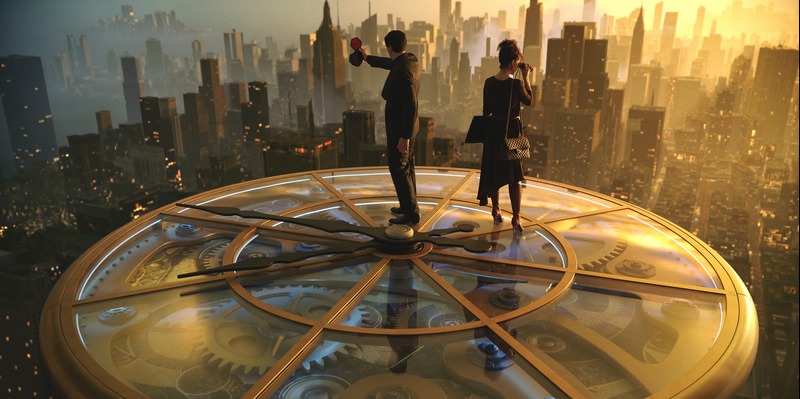There are no words that can be put down on page to describe the sheer chaos of Megalopolis, the latest film by legendary director, human trashbag, Francis Ford Coppola. It deliberately pushes the boundaries of what cinema is capable of at every turn: America repositioned as a debauched Roman Empire drenched in success, New Rome transforming into a Utopian future as the old ways come crashing down upon him. Coppola was so committed to the making of this picture that he invested his own money, sold his winery to do so – and recruited some of the best and most talented actors on the market; Adam Driver, Giancarlo Esposito, Nathalie Emmanuel, Aubrey Plaza and more, for a story about the Fall of Rome – two giants, genius Cesar Catilina and Mayor Franklyn Cicero, trying to uphold the old order. Cicero’s daughter, socialite Julia – is caught between both, her father and her lover – as the film faces the age old question: what does humanity deserve?
Rivalling such chaotic swings at the fences as Southland Tales and the Wachowski sisters’ later works, Megalopolis could only be made without a focus group, without anyone to tell Coppola no. It’s as personal as you could have hoped, an eccentric daring to stake his fortune on a vision for the future, a meta-contextualised study arriving right at the tipping point: who knew Coppola could be so timely? It’s a project almost 40 years in the making, the film opens with Driver’s Caesar literally stopping time – halting it in its tracks. Coppola is making a film about the old order – a man who believes in America, but this is a film that is making him question whether America is worthy of that belief. The overthrow of the Republic choked in the grip of socialites and aristocrats baying for blood at the circus is uniquely transported int the modern era, there’s a feel of the Old Hollywood noir to it. It feels like a science fiction movie made in the 1950s – at almost three hours long, it’s a rare relic of Golden Age. A movie out of time and out of focus, dealing with a noir-heavy plot at every turn.
It does it justice. The mysteries are fascinating, you have age-old order, classic literature, urban planning being a healthy epicentre of the film’s narrative. Urban planning has never been quite as interesting as it has been presented here – the clash of new ideas vs. the old order; the old truth vs. the new, Giancarlo Esposito finally cast in a role that doesn’t just let him be Gus Fring – allowing to experiment with the wild upwards and downwards trends of politics. The rather audacious theatre set-piece around the film’s mid-act swings for the fences in style; bold, bravado – full of chaos and energy – with Coppola taking aim at celebrity status at every turn. This is what Rome looked like before the fall of the Empire; he tells us.
The performances are hammed up and theatrical; Megalopolis feels more like a play than a cinematic production, performances enlarged to represent these greater than life – Go back to the Club, Driver tells Emmanuel early on -in a sure-to-be-memed theatrical performance. But this is not a misstep; this is Driver in top form, awkwardly unhinged – a man out of touch with society elevated to his status. His career has only gone from strength to strength, working with oft-reviled late-period Mann, Scott and Carax (of which, Annette perhaps would feel the most comparable to the bold vision state of Megalopolis), but here he feels in unbeatable form. Emmanuel plays the socialite caught under his spell superbly – her role escalating in momentum as it cascades towards a climax – which albeit, feels unearned, feels like the role of a master at work. The Catilinarian conspiracy is retold in modern day New York to full effect here – whilst Jon Voight and Shia LaBeouf both stilted; the collective whole is a visionary work – a scene in which Driver’s Cesar interacts with an audience member wasn’t recreated in my screening, save the poor underpaid souls of a Cineworld staff member, but its effect was paramount – creating an alien world divorced from reality and trapped in a creation of its own making. Coppola’s gender-roles feel a bit old-fashioned and perhaps that’s the only criticism here, more agency for both Julia and Aubrey Plaza’s Wow Platinum wouldn’t have gone amiss, with each actor going for a variety of different performances across the stage – Plaza’s camp feels like a different film from Driver’s Cesar, but deliberately so, these clash of styles colliding in a way that makes Megalopolis feel greater because; not despite them.
The film feels full of despair and unease in the sense that it feels so overwhelming you never want to watch a movie again after leaving the cinema – as an end point for Hollywood as an artform, Megalopolis acts as such – and whilst its ending almost feels unearned, there’s enough here to love for the bulk of its almost three hour runtime, an audacious, bold effort that can’t help but be admired regardless of what side of the fence you fall on – it manages to find some sense of humour amidst it all. I love that we've had both this and The Substance this year; two wildly different yet completely original works of art - showing that cinema is in a lot safer, as oxymoronic as it sounds, a place when studios aren't afraid to take risks. And this may be the biggest risk of the decade.


